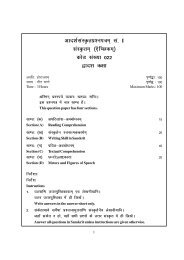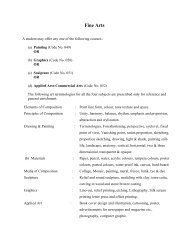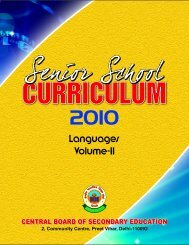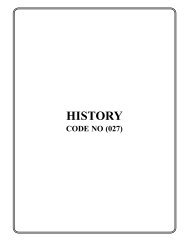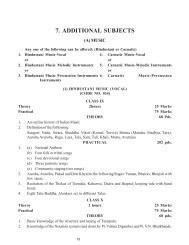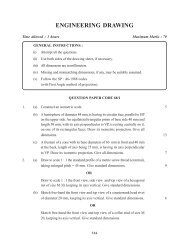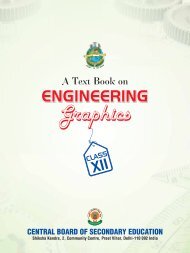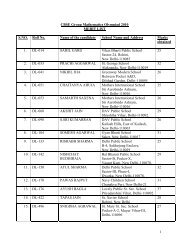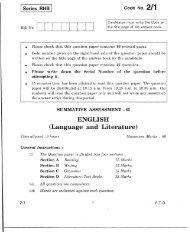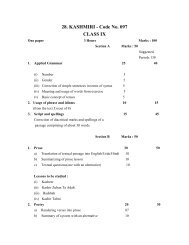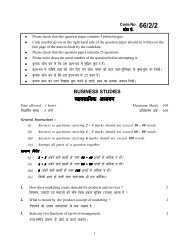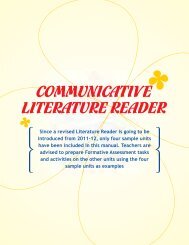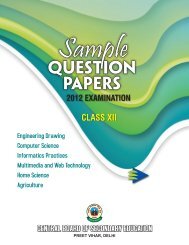sample question papers - Central Board of Secondary Education
sample question papers - Central Board of Secondary Education
sample question papers - Central Board of Secondary Education
You also want an ePaper? Increase the reach of your titles
YUMPU automatically turns print PDFs into web optimized ePapers that Google loves.
outsider. On the contrary, other children will usually respect their independence and recognize<br />
-even envy - the richness <strong>of</strong> their alternative activities. More subtle is the mistaken belief that<br />
the experience that children gain from watching television is the same as when the adults watch<br />
television, their own past and present experiences come into play, so that they can test the view<br />
<strong>of</strong> the world presented on the small screen against their knowledge <strong>of</strong> real life. But young<br />
children have very few real-life experiences to set against their viewing, so that for them TV is<br />
primary source <strong>of</strong> experience; their formative years are spent largely in an unreal, unnatural,<br />
second-hand world.<br />
6. It is also universally assumed that TV is an important source <strong>of</strong> learning. Like an animated<br />
picture book it presents in an easily digested and entertaining way a great deal <strong>of</strong> information<br />
about the natural world, history, current affairs, other countries and so on. But the 'knowledge'<br />
<strong>of</strong> today's television-educated children, spouting words and ideas they do not fully understand<br />
and 'facts' whose accuracy they cannot judge from their limited experience, cannot compare<br />
with the knowledge acquired by reading or activity. It is then that children use their minds and<br />
their bodies, their imaginative and reasoning power, to enrich their lives.<br />
7. Only when parents begin to <strong>question</strong> the nature <strong>of</strong> television itself and its effects on their children<br />
and on themselves as parents will they begin to realize that it is not the programme but television<br />
itself and especially the good programmes – which poses the greater threat to their children's<br />
well-being. (Adapted from Plug-in Durg by Marie Winn)<br />
a) On the basis <strong>of</strong> your reading the passage answer the <strong>question</strong>s given below: 9<br />
(i) Why is the ACT against frequent commercial breaks on the small screen. 2<br />
(ii) What are three reasons given by the author to justify the harmful effect<br />
TV has on the children ?<br />
3<br />
(iii) How are adults able to relate to the programme on TV ? 1<br />
(iv) What do you understand by the phrase second-hand world ? 1<br />
(v) How does the author differentiate between the knowledge gained by<br />
watching TV programmes and that gained by reading ?<br />
2<br />
b) Pick out the words from the passage which mean 3<br />
(i) continuous (para 2) 1<br />
(ii) tendency to have a low opinion <strong>of</strong> people's reasons for doing things (para 4) 1<br />
(iii) pour out in a stream (para 6) 1<br />
2. Read the passage given below : 8<br />
In the democratic countries, intelligence is still free to ask whatever <strong>question</strong>s it chooses. This freedom,<br />
it is almost certain, will not survive another war. <strong>Education</strong>ists should, therefore, do all they can,<br />
while there is yet time, to build up, the men and women <strong>of</strong> the next generation who will otherwise be<br />
at the mercy <strong>of</strong> that skilful propagandist who contrives to seize the instruments <strong>of</strong> information and<br />
persuasion. Resistance to suggestion can be built up in two ways. First, children can be taught to rely<br />
on their own internal resources and not to depend on incessant stimulation from without. This is<br />
doubly important. Reliance on external stimulation is bad for the character. Moreover, such stimulation<br />
is the stuff with which propagandists bait their books, the jam in which dictators conceal their ideological<br />
pills. An individual who relies on external stimulations thereby exposes himself to the full force <strong>of</strong><br />
whatever propaganda is being made in his neighborhood. For a majority <strong>of</strong> people in the West,<br />
2



